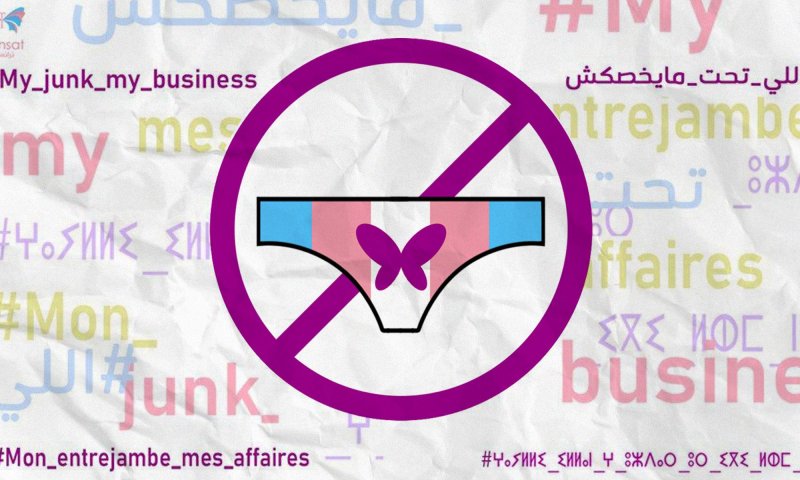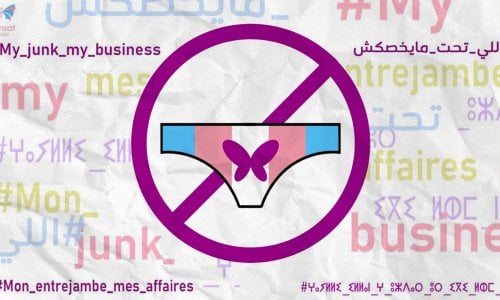November is Transgender and Gender Nonconforming Communities awareness month. This year, the online pan-Arab group Transat has chosen the theme ‘My Junk, My Business’ #اللي_تحت_مايخصكش to speak up against the harassment Arab Transgender people face.
“Our genitals, or ‘junk’ is the biggest contributor to our struggle. People feel entitled to our bodies simply to satisfy their curiosity - or obsession - disrespecting us, invalidating us, mocking us and reducing our humanity,” said Basel, a transgender man who is one of the campaigners.
Farida Abo Aouf, an Egyptian transgender woman, believes that the campaign is important in the Middle East because it is “where people are most obsessed with sexual thoughts revolving around people’s genitals”.
The persistent questioning of trans people regarding their bodies and genitals makes their daily interactions stressful. “[It] is nothing short of sexual harassment, it disregards our humanity and right to privacy,” Basel stated. It affects trans people’s lives in all aspects - socially, professionally, offline and online.
Social spaces are a constant battleground. “The first question a transgender is asked is ‘What have you got down there?’,” Abo Aouf said. Even when the question is framed as "are you a boy or a girl", many times posed by complete strangers, it is another way to inquire about a person's genitals, explained Basel.
“Knowing that transphobia is very common in society and that people insist on knowing another's gender and body, it can make it hard for us to be confident in forming friendships, coming out to our friends and relatives, or bonding with co-workers,'' said Basel. In addition, while many trans people find freedom in being themselves online, the openness lures in invasive questions. “It is very easy and common for people to ask us these kinds of questions, because it's anonymous and you are not face-to-face with that person,” the transgender man said.
Coming out as transgender to an Arab family is difficult as it is, but transitioning from male to female has an added layer of stigma. The gender hierarchy still prevails for Arab families regard men as better than women!
Maya Anwar, a Jordanian transgender woman says: “I’ll always be the son who removed his penis to become a woman, the person who brought shame to the family. I’ll always be the one who went down one level”.
Children and youth are still sent to conversion therapy, as most Arab doctors believe being trans is an “illness” you can intervene with "early" to stop it from "progressing" and the eventual transitioning is considered a "last resort" when "all else fails".
Genital obsession also affects dating and relationships. “When someone likes you and then discovers you are a transgender person, the first reaction is to inquire about genitals,” Abo Aouf maintained. Normally, it is asked to find out if it they would get pleasure out of or not, and if it looks ‘normal’ or ‘abnormal’, she believes. “They put beauty standards even for genitals.”
Some people take it further, asking to see ‘what is down there. “Not only was I reduced to an organ, it became permissible for people to see it, and they need to see it to accept me,” Abo Aouf said, others go a notch higher, and ask if they can ‘experiment’ in bed.
Reducing a woman, cis or trans, to her genitals is part of misogynistic Arab society, Abo Aouf stated, adding that she refuses to be defined as a woman based on if she “turns a man on” or not.
Dating apps are notorious for opening conversations inquiring about trans people’s genitals and bodies, Basel said. “Not every encounter on these apps will lead to sex…so starting a conversation right away with that is just invasive, people who ask this do it just for the curiosity or entitlement. Even if it's a dating setting, surely there are more respectful ways to opening a conversation?,” he stressed.
Many trans people describe themselves with phrases such as "pre/post-op" (if they have gone through corrective surgery or not) or "pre/on hrt" (if they have started hormonal treatment or not), or plainly mention their genitals in their app biography. “So cis people should familiarize themselves with these terms rather than expect trans people to constantly explain,” believes Basel, pointing out that there is a constant burden on trans people to educate whenever they face questioning or invalidation.
“The way I see it, unless it comes up, then there is no reason to ask...And if the trans person doesn't take initiative when its leading to sex, then it can still be asked in a tactful way...Lastly, this might anger some people, but preferences aren't formed in a vacuum. By all means, have your preferences, but you should also reflect on it and don't get defensive,” Basel held.
“If you're looking for a romantic relationship, then this is definitely not what you'd start with. You would get to know the person first,” Basel said.
Eman*, a transgender woman who used to live in the United Arab Emirates, has her own tactic. “I shake their grounds and see what they are made of, like making a joke but with a serious face ‘hey do you want to transition or do you want have sex with me?’. And believe me you get to see their core after that,” she told Raseef22.
But the genital struggle, and the harassment that goes with it, starts the moment a person realizes they are not the gender they were assigned at birth.
Eman was forced to flee from her family in Dubai because of domestic violence. Growing up, she would crossdress, which enraged her brother. He would beat and burn her. He cracked several of her teeth, broke her nose, and forced her to cut her hair against her will.
When Abo Aouf first decided to tell her mother that she was not a boy, the reaction was to have her reproductive organs checked, and doctors said they were perfectly functional. “I got embarrassed. How do I begin to explain?,” recalled Abo Aouf.
Coming out as transgender to an Arab family is difficult as it is, but transitioning from male to female has an added layer of stigma. The gender hierarchy still prevails; Arab families regard men as better than women, highlighted Maya Anwar, a Jordanian transgender woman. “I’ll always be the son who removed his penis to become a woman, the person who brought shame to the family. I’ll always be the one who went a level down,” she said to Raseef 22.
Medical care is no exception to the ‘junk’ problem. Many trans people recount invasive experiences with curious and misinformed doctors, even when they require medical assistance for something not related to being trans. This consequently makes them avoid seeking healthcare. Medical services related to transitioning is a completely different challenge.
“The very little and heavily gate-kept medical services in the Arab world currently available are no good,” Basel said, adding that it places their fate in the hands of a cis doctor “who will never truly understand us”, and insists on being "convinced" that they deserve to live as they need to.
“This is simply violence against people who have been forced to wait all their lives, only to face more waiting and barriers to their transition after finally reconciling with their identity,” Basel highlighted.
Children and youth are still sent to conversion therapy, as most Arab doctors believe being trans is an “illness” you can intervene with "early" to stop it from "progressing", Basel said, continuing, “which means they will have to act and present as something they are not...leading to dysphoria, depression, anxiety and helplessness throughout formative and important years of one's life. We as trans adults know all this harm very well, and feel as though our youth was lost and a dark chapter”.
“Many transgender women, including myself, would look down while showering and think ‘is this the thing causing us so much grievance?’ and thoughts about cutting it off would cross our minds,” said Abo Aouf.
Transitioning is considered a "last resort" when "all else fails", Basel underscored.
When trans people finally do access medical healthcare, they can be faced with shortages of hormones in pharmacies, very high surgery costs, unavailability of experienced surgeons, little and confusing information. For example, trans men in particular know very little about surgery options. There are also countless hurdles in changing papers and identification.
“You can never change your official documents, your name and gender marker, unless you undergo the surgical procedures. And the surgery is not allowed in most [Arab] countries. So, your appearance will be something, and your documents will say something else. With this issue, you’ll face the problems in work, education, dating and other things,” said Anwar. For example, the appearance of some trans people who started their treatment at an early age, reflects the gender they identify with, but their documents don’t. As such, they can’t get registered in schools or universities. This is not to mention bullying, which caused several trans people to drop out of school.
“Gender is in the brain, it comes from inside, how do you feel about yourself. Where you feel that you belong,” stressed Anwar. Abo Aouf agrees, saying “We are not only bodies, we are bodies and brains, souls, psyches, identities and sexual orientations.''
In a two-gender binary world, asking about “what is down there” completely erases transgender people who do not want to go through surgery, gender fluid Arabs, and crossdressers. “You have to be binary, very conforming, heterosexual, religious, ‘always known’, and so on,” Basel said. This also creates a divide between ‘normal’ trans people and ‘deviant’ trans people.
“It all comes down to invalidation. Who I am is not convincing because of my genitals. To them, my genitals ‘prove’ something that I verbally contradict - which they then turn to stigmatizing me as mentally ill,” the he said.
“As long as society is built on hetero-patriarchal binary ideals, then trans and gender-non-conforming people will continue to struggle. It will take nothing less than a feminist revolution, starting from the ground up to truly liberate us,” Basel concluded.
Raseef22 is a not for profit entity. Our focus is on quality journalism. Every contribution to the NasRaseef membership goes directly towards journalism production. We stand independent, not accepting corporate sponsorships, sponsored content or political funding.
Support our mission to keep Raseef22 available to all readers by clicking here!
Interested in writing with us? Check our pitch process here!




